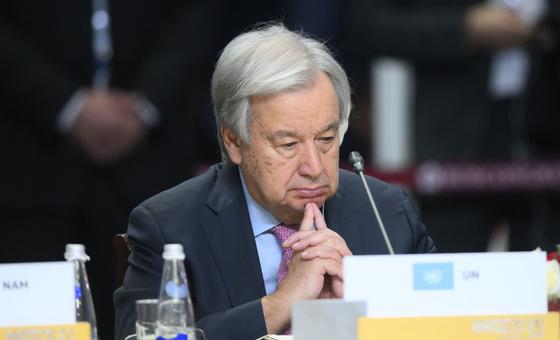He urged the bloc to help forge a more equitable global finance system, boost climate action, improve access to technology and work towards peace, particularly in Gaza, Lebanon, Ukraine and Sudan.
BRICS was founded in 2006 by Brazil, Russia, India and China, who were later jointed by South Africa, Iran, Egypt, Ethiopia and the United Arab Emirates. Collectively, they represent nearly half the world’s population.
Address global challenges
Mr. Guterres saluted their valuable commitment and support for international problem-solving.
“But no single group and no single country can act alone or in isolation. It takes a community of nations, working as one global family, to address global challenges,” he said.
They include the increase in conflicts, climate change, rising inequalities and lingering poverty and hunger, as well as “a debt crisis that threatens to smother plans for the future of many vulnerable countries.”
Furthermore, fewer than one-fifth of the 17 Sustainable Development Goals (SDGs) are on track, the digital divide is growing, and bodies such as the UN Security Council and the Bretton Woods institutions lack representation by developing countries.
Pact for the Future
Insisting that “this must change”, Mr. Guterres pointed to the Summit of the Future, held at the UN in September, which put forward a roadmap for strengthening multilateralism and advancing peace, sustainable development and human rights.
It concluded with the adoption of a Pact for the Future covering sustainable development, international peace and security, science and technology, youth and future generations, and transforming global governance.
A Global Digital Compact and Declaration on Future Generations are in the annex.
“The Summit of the Future charted a course to strengthen multilateralism for global development and security. Now we must turn words into deeds and we believe BRICS can play a very important role in this direction,” he said.
Reform global financial architecture
Mr. Guterres outlined four areas for action by the BRICS, starting with finance.
He said the Pact for the Future calls for accelerating reform of the international financial architecture, which is “outdated, ineffective and unfair”.
It also includes a commitment to move forward with an SDG stimulus plan to support developing countries by substantially increasing the lending capacity of multilateral development banks.
“Next year’s Conference on Financing for Development and the Summit on Social Development are two milestones to carry these efforts forward,” he said.

Women wade through flood water in a neighbourhood in Kinshasa, DR Congo. (file)
Ambitious climate goals
Addressing climate change, Mr. Guterres stressed the need for “dramatic action to reduce emissions now” to limit global temperature rise to 1.5 degrees Celsius.
“COP29 is just weeks away,” he said, referring to the UN climate conference in Azerbaijan next month.
“That starts the clock for countries to produce new Nationally Determined Contributions plans with 2035 targets that are aligned with the 1.5-degree goal.”
He said the conference “must deliver an ambitious and credible outcome on the new climate finance goal.” At the same time, developed countries must keep their promise to double adaptation and finance, and ensure meaningful contributions to the Loss and Damage Fund.
Access to technology
Meanwhile, every country must be able to access the benefits of technology, and the Global Digital Compact commits to enhanced international cooperation and capacity-building in this area.
“It includes the first truly universal agreement on the international governance of Artificial Intelligence to give every country a seat at the AI table,” he said.
It calls for an independent international Scientific Panel on AI and initiating a global dialogue on its governance within the United Nations with the participations of all countries.”
Moreover, the Compact requests options for innovative financing for AI capacity-building in developing countries, he added.

A family walks past a destroyed mosque in Gaza.
‘We need peace’
For his final point, Mr. Guterres said the international community “must strengthen and update the machinery of peace,” which includes making the Security Council more reflective of the world today.
He noted that the Pact for the Future contains important steps on disarmament. This includes the first multilateral agreement on nuclear disarmament in more than a decade, as well as steps to address the weaponization of outer space and the use of lethal autonomous weapons.
“Across the board, we need peace,” he said.
“We need peace in Gaza with an immediate ceasefire, the immediate and unconditional release of all hostages, the effective delivery of humanitarian aid without obstacles, and we need to make irreversible progress to end the occupation and establish the two-State solution, as it was recently reaffirmed once again by a UN General Assembly resolution.”
Peace is also needed in Lebanon, with an immediate cessation of hostilities, moving to the full implementation of UN Security Council resolution 1701 (2006).
Read our explainer about the resolution here.
“We need peace in Ukraine. A just peace in line with the UN Charter, international law and General Assembly resolutions,” he continued.
“We need peace in Sudan, with all parties silencing their guns and committing to a path towards sustainable peace.”
The Secretary-General recalled that these were the same messages he delivered to the High-Level segment of the UN General Assembly in September.
“Unfortunately, they remain valid here and now,” he said. “Everywhere, we must uphold the values of the UN Charter, the rule of law, and the principles of sovereignty, territorial integrity and political independence of all States.”

